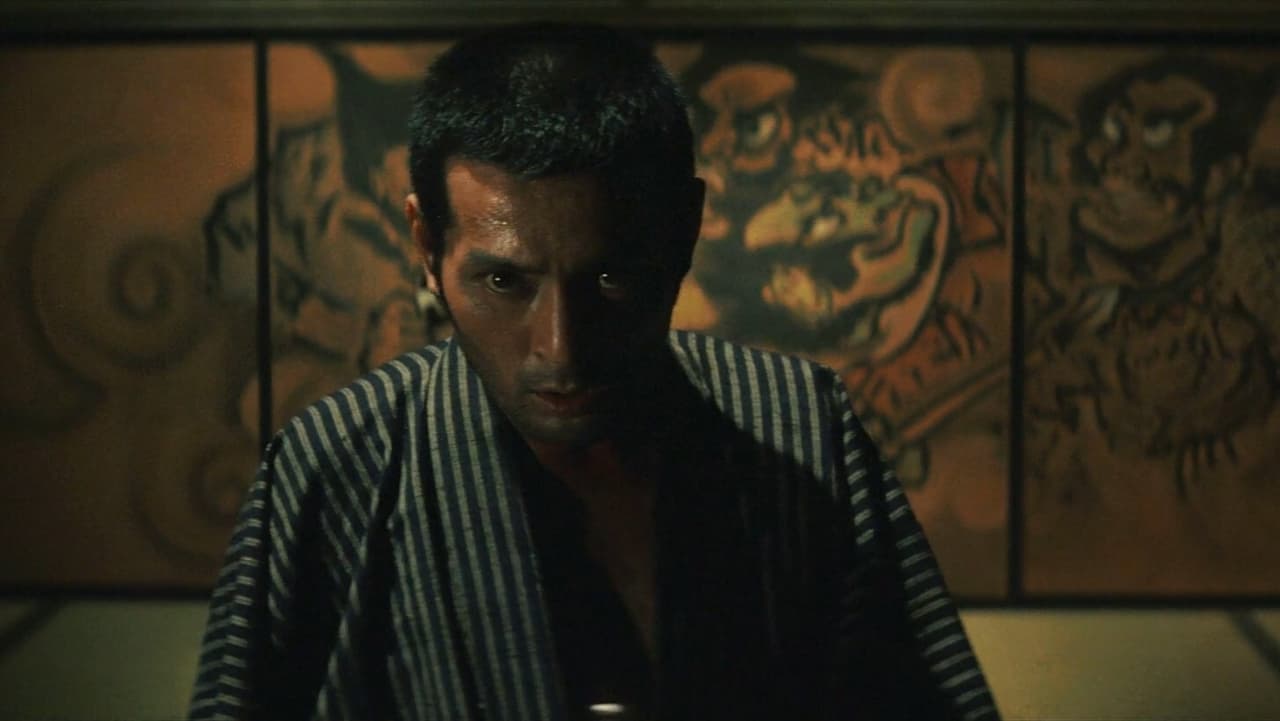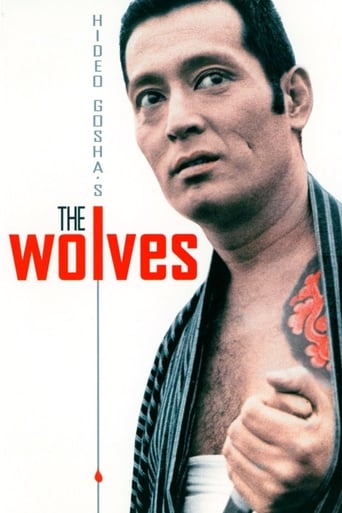Dirtylogy
It's funny, it's tense, it features two great performances from two actors and the director expertly creates a web of odd tension where you actually don't know what is happening for the majority of the run time.
Erica Derrick
By the time the dramatic fireworks start popping off, each one feels earned.
Quiet Muffin
This movie tries so hard to be funny, yet it falls flat every time. Just another example of recycled ideas repackaged with women in an attempt to appeal to a certain audience.
Freeman
This film is so real. It treats its characters with so much care and sensitivity.
chaos-rampant
I've said it in every review I've written about Hideo Gosha and I'll say it again. There's no Japanese director more criminally, terribly, shamefully underrated than the great Hideo Gosha. No director who soared in the artistic heights Gosha did is more underseen and undiscovered. Following his early period of pulpy stylized chambaras, Gosha progressively tackled bigger, better and significantly more ambitious projects. This golden era that began so triumphantly with GOYOKIN, easily among the ten most stunningly beautiful Japanese films of all time, found its ultimate, irrevocable and titanic culmination in KUMOKIRI NIZAEMON, a film so labyrinthine, complex and breathtaking and so full of ideas as to contain enough material for two great movies. THE WOLVES is a step in that direction, part of that niche - ultra stylish, socially-minded, with a serpentine plot and epic in scope. Yet for that reason, a film best enjoyed by the Japanese cinema aficionado who is familiar with the often convoluted nature of these films. The novice might have to rewind the first 30 minutes a couple of times.Indeed Gosha opens the film TOO fast. And then slows down to a crawl until the bloody finale. The opening narrative is an interesting experiment of Wellesian proportions, something that combines Kinji Fukasaku's ideas of montage and superimposed titles, yet in the same time takes them to the next level. Thirty years before Guy Ritchie would do it for quirk's sake, Gosha had already done it better.A typical plot, perhaps intentionally generic, involves the rivalry and subsequent reconciliation between two yakuza families and all the scheming and backstabbing that slowly comes to the surface. Tatsuya Nakadai's character, a yakuza underboss fresh out of prison as the film begins after doing time for the murder of the rival family's boss in retribution for the bombing of his clan's log work site, ruminates at one point: "If I can't believe in his yakuza honor then what is left to believe in?". This is not a ninkyo chivalry yakuza film however, here the yakuzas are exactly what the title says. Ruthless thugs, street cutthroats throbbing with greed and ambition. People whose word is honorable as long as it serves them right, or as long as no one knows otherwise. At the root of all trouble, as with earlier Gosha films like SWORD OF THE BEAST and GOYOKIN, is gold.The dualistic treatment of Tatsuya Nakadai's character, Iwahashi, also carries echoes of earlier Gosha characters like Magobei or Gennosuke. Disillusioned with his life and the hypocrisy of the yakuza, he's a tired middle-aged man who's laid ambition by the wayside. At the same time he's an instrument of revenge, an angel of death called to strike down with great vengeance. It's around this duality, passive and aggressive by circumstance, that Gosha builds the different moods of the movie: for most of the duration, the film languors in a dreamy haze lulling the viewer in a sense of false security through pictorial beauty. Yet, exposition is constant. Dark secrets behind the seemingly perfect alliance between the two ex-rival families slowly emerge and things are about to change.For Gosha, as with other Japanese directors from the sixties, style IS substance. That is not to say the film lacks what is typically regarded as substance. Gosha has a story to tell, a premise to fulfill, a conclusion to arrive at. But he's a storyteller of visual excellence. To say Gosha's style IS substance is to advise the viewer to scan the frame for the details Gosha has planted there. Racking focus is one of his favorite tricks for example: watch how he shifts focus between a face, a hand that pounds a drum, and painted demons in the background of a carnival chariot, all in the same frame. Watch how the painted door panels comment on the foreground action in the final climax. Watch the overly theatric final showdown, one that blends Sergio Leone's ceremonial abstraction of the duel with Kabuki theater. Watch the topology he so carefully constructs: the carnival, a place of disguise, raw animal energy, intrigue and murder. The solitary beach strewn with the broken vessels of old ships, with seabirds flying over them: a dreamy limbo of sorts, a place for old lovers to reunite in, old friends and now foes to die in.All in all, although THE WOLVES is not among Gosha's best films, it's just short of them, which makes it not just one of the best yakuza films of the time but also one of the best gendaigeki dramas.
Terrell-4
Some critics recently have said that Hideo Gosha's samurai movies are to Kurosawa's samurai movies what Bud Boetticher's westerns are to John Ford's westerns. Maybe all that means is that Ford at the top of his game made some great movies that happened to be westerns while Boetticher at the top of his game made some first-class westerns. Shussho Iwai (The Wolves) is as well-crafted a sword-slasher as you'll hope to see, full of angst, conflict, sex and blood, with just enough artiness -- lovemaking reflected in rainwater, two silent, unexpected knife killers, a puppy on the beach, the plaintive plucking of a lonely samisen -- to keep the auteur-lovers happy. The film is an accomplished tale of tricky betrayal and fate that moves briskly along. For those who think they'll find a few flakes of gold among the pyrite, they won't be disappointed. The Kan'non-gumi and Enoki-ya are competing yakuza gangs in northern Honshu. Four years ago Seji Iwahashi (Tatsuya Nakadai) and several others were imprisoned when they took part in a bloody fight between the gangs over control of a railway being built. While he was in prison his old gang leader died. He would have been named boss, but in his absence another was chosen. They were pledged "brothers." In an amnesty at the beginning of the Showa era, he and the others have been pardoned. He rejoins his gang, makes no fuss about who is boss...and discovers that not only have the two gangs joined in an alliance, but that the young daughter of the old Enoki-ya gang leader who a good friend loves and who also was released but seems to have disappeared is just about to marry the co-gang leader from Kan'non-gumi and that, yes, his "brother," the new gang leader for Enoki-ya, is the other co- gang leader for the alliance. That's not all. There are major business interests, this being the late Twenties, that want Honshu's timber for building railways in Manchuria. Got all that? With complicated melodrama like this, it's vital how well the director keeps things moving so that we don't dwell too much on the details. So we have a tale of violent yakuza gangs in an unstable alliance, of a couple who love each other and add to the sparks of violence, and of betrayal, of power, of business interests, and of Seji Iwahashi...a brave man filled with sadness and resignation, who still is a creature of the yakuza code. "We swore to be brothers," he says. "If I can't believe in such a yakuza oath, what else is there to believe in?" In the first hour of Shussho Iwai you'll be thoroughly confused if you don't keep a chart of the various players, who is doing what and which gang they're in. The last hour, however, is quite a show of trickery, fatalism and betrayal. The climax of the movie, at what would have been the wedding ceremony, is memorable. The swordplay doesn't dominate, but there's enough to remind us how slippery all that slashing can make things. The predominate theme, however, is plain old betrayal. And those two delicate killers, by the way, add a lot of urp to the oden. If their killing of Matsu, a member of the Enoki-ya gang, doesn't do it for you, you just don't know how to enjoy a good, lengthy murder.
Chung Mo
Unlike many other films by Hideo Gosha this one sort of operates as a reverse action film. The first ten minutes are the most exciting and visually active and the climax, despite the brutality on screen, is almost leisurely. Was that the intent? It's hard for me to say. The film follows the lives of several gangsters after they have been suddenly pardoned by the new Japanese government in the late 1920's. Jailed after a fatal inter-gang fight the ex-cons attempt to return to their old gangs but find everything has changed. Things don't go easy and the inevitable final conflict is set in motion.Dense with plot and gangster etiquette, this is not an easy film to jump into. Gosha's earlier samurai films are more accessible. The plot revolves around Tatsuya Nakadai's withdrawn and moody gangster but it takes detours with some of the other characters which can be confusing. The photography is dark and saturated with color. It's hard to see clearly what's happening at times but that seems to have been intentional. The fights are very realistic with nearly everyone killing each other with short knives. Not the clear stylized slashes of a samurai sword where the victim just falls over dead, these are brutal horrible deaths. The excellent music is very influenced by Morricone's western themes unfortunately including the incessant repetition of the same theme over and over (something that Morricone really didn't have control over). The pacing is slow, sometimes pretentious. At two hours it can be an effort.I saw this in the late seventies at it's New York premier and just again recently. I feel the same way about it still. You may like it but be prepared for the slow pace after the quick start.
bungle-2
This film is so marvellous to look at that you may wonder if Rembrandt has been re-born as a Japanese movie-director. Hideo Gosha has made an undisputable master-piece about rivalry, betrayal and the feud over a train-line. It is a classic gangster-film with a labyrinth-like plot. The Wolves is the real thing. This film is one of the best films ever made.

